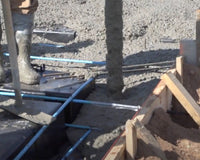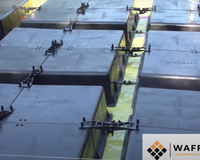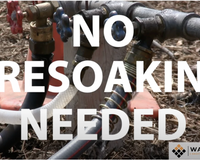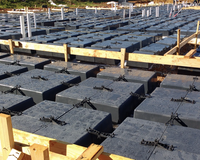A geotechnical survey is always required before a residential construction project can begin. But if you have multiple projects within a subdivision, do you really need a report for every lot? Or, do you only need a report that covers the general area?

The answer depends on the specifications of your project, the advice of your geotechnical engineer, and the scope of your report.
Learn when a geotechnical survey covers every lot and when you need an updated report to complete your project.
Geotechnical reports can cover multiple lots
A geotechnical survey can cover more than one lot when the report accounts for this. Your geotechnical engineer needs to understand the full scope of your residential construction project before they begin their soil research.
This information will help determine the required number of borings for your project, allowing you to use your residential geotechnical report to cover multiple lots. The required number of borings will vary according to load-bearing, soil conditions, location, and the size of your structures.
Your geotechnical engineer will also consider the variability of soil conditions for the size of your project. This may increase the number of borings required to accurately measure subgrade conditions and provide expert recommendations based on their findings.

Each report is made to the specifications of a project
Every geotechnical report contains a boring report, lab analysis, and recommendations based on this data. Reports, however, are drafted for the specific project requirements being introduced by the owner. This is why some reports cover one structure, while others can account for structures on multiple lots.
Important factors for a geotechnical survey:
- Structure size
- Soil conditions
- Location
- Water table height
- Environmental disturbances
- Load-bearing
Nearby geotechnical reports may be applicable to your site. This remains true especially when building over soil that has previously undergone construction.
When should you get a survey for every lot?
Contact us for a geotechnical engineer reference to learn what kind of report you need for your site. They can guide you through code requirements and what your building official needs to approve a structure.
A geotechnical survey should be ordered when building a single project on an isolated lot, when a geotechnical survey for an entire development does not exist, or when building on an older building site where this information is not available. Additionally, in some municipalities the local building official may require a geotechnical survey for each lot, or may accept a report from an adjacent lot.
You may still need a valid geotechnical survey if the report doesn’t fit the scope of your project. Additional boring samples may also be needed if there’s a history of excavation, construction, and heavy machinery use in the area.
Even if your site falls under an exemption, you may still need to contact a geotechnical engineer. An open line of communication with your geotechnical engineer will help you overcome potential challenges and adapt to changes.
The importance of having an up-to-date soil report cannot be overstated. The report will contain expert recommendations to help cut costs, avoid foundation failure, and ensure everything is up to code.

Soil report cost for multiple lots
Pricing will vary according to your location, project scope, and soil conditions. Geotechnical engineers typically charge per boring. The cost of each boring can be affected by the required lab tests, depth, and necessary equipment for retrieving a sample.
The bore log report in foundation engineering is the primary way to learn about soil at its various depths. Boring provides the greatest amount of information on a site’s soil and properties. The information obtained from these samples will serve as a resource for everyone involved with a construction project.
Costs can range from $1,000 to $5,000, but it’s well worth the money you can save on future repairs. Building on a lot without adequate knowledge of your soil can lead to expensive damages to structures and their foundations. Repairing this damage is difficult to do and can be intrusive to occupants of the structure.
Get answers to your geotechnical report questions
Before any project can begin, you’ll need a valid geotechnical report. They can make or break any project, so you want to ensure you get the right report for your needs.
We’ve worked with our fair share of geotechnical engineers and soil reports for various projects. Learn more about geotechnical investigations by reading our articles by engineers in the field. Read from first-hand knowledge and find all the answers to your soil questions.
Or, Contact a Wafflemat Staff Member Today to chat with one of our experts.





